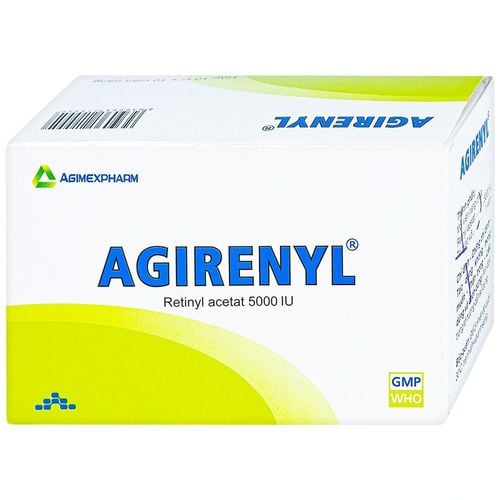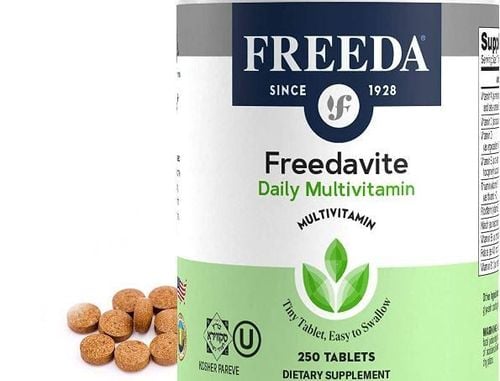This is an automatically translated article.
The article was consulted with Master, Doctor Nguyen Thi An - Pediatrician - Neonatologist - Department of Pediatrics - Neonatology - Vinmec Ha Long International General Hospital.Vitamin A plays an extremely important role in the health and development of children. In addition to supplementing vitamin A through food sources, parents can give children supplements in the form of capsules, especially in the first 3 years of life, children need to take high doses of vitamin A supplements. Currently, each year, the state organizes 2 rounds of vitamin A intake for children to avoid vitamin A deficiency, which negatively affects children's health.
1. Why do children need vitamin A supplements?
Vitamin A is an important nutrient that benefits children's health. Vitamin A helps to improve eyesight. Adequate vitamin A helps protect against some eye diseases in low light conditions, vitamin A plays a role in creating retinal pigment that helps the eyes to see. Reduced ability to see in low light, commonly known as "night blindness", is an early manifestation in children when vitamin A deficiency is present.Vitamin A helps the child's body to grow. Besides vitamin D, vitamin A also plays a role in supporting bone development, and body development in children. Children will be slow to grow, stunted and malnourished if vitamin A is deficient.
Besides, if vitamin A deficiency reduces mucus secretion and inhibits keratinization, children's eyes become dry, skin becomes rough, chink.

Vitamin A is involved in making a number of cells, including B and T cells, that play a central role in immune responses that protect against disease.
A deficiency in this nutrient leads to increased levels of inflammatory molecules that reduce the response and function of the immune system.
Trắc nghiệm: Sự phát triển tinh thần, vận động của bé thế nào là đúng chuẩn?
Khi nào bé biết nói, biết hóng chuyện hay biết cầm cốc là "đúng chuẩn"? Điểm xem bạn biết được bao nhiêu mốc phát triển tinh thần, vận động "đúng chuẩn" của bé nhé!The following content is prepared under supervision of Thạc sĩ, Bác sĩ y khoa, Ma Văn Thấm , Nhi , Phòng khám Đa khoa Quốc tế Vinmec Dương Đông(Phú Quốc)
2. Sources of vitamin A for children
Breast milk is always a rich source of vitamin A for babies, so mothers should breastfeed their babies, especially in the first 6 months.When children start to eat solids, it is recommended to add to their diet to ensure adequate nutrients, foods containing a lot of vitamin A such as meat, fish, eggs, milk, mammal liver, etc. butter, cheese, green vegetables, dark yellow, dark green, dark red fruits.
It is necessary to use many different foods in a diverse and rich way, with an attractive and palatable way of processing that will help children increase absorption.
Priority should be given to foods rich in vitamin A and carotene. Children's meals need to be balanced and have enough protein and fat to help increase absorption and metabolism of vitamin A.

Currently, the state organizes 2 sessions of vitamin A intake per year, once every 6 months, for children aged 6-36 months, parents need to take their children to a local health facility to Children are given vitamin A regularly.
3. 2 sessions of vitamin A for children per year - High dose vitamin A supplement for children
In order to prevent vitamin A deficiency for children under 5 years old, currently, every year, the State organizes 2 periodic vitamin A intake sessions on June 1-2 and December 1-2 for children under 5 years old. 6 months old cannot be breastfed and children under 5 years old are at risk of vitamin A deficiency.Parents need to take their children to a local health facility for advice and take vitamin A in the right dosage.
For children under 6 months of age who are not breastfed, 50,000 units of vitamin A should be supplemented.
For children aged 6-12 months, 100,000 units of vitamin A should be supplemented. Give them by holding capsules. with the tip of your index finger and thumb, then cut the tip of the capsule with scissors and then squeeze the number of drops in the capsule. Give the child half a tablet (about 3-4 drops) and then give him a spoonful of dessert water.

For children under 5 years of age at risk of vitamin A deficiency, the dose of vitamin A supplement depends on the age of the child.
Vitamin A is an important nutrient for the body. Vitamin A deficiency or excess vitamin A both seriously affect the health of children. Therefore, parents should be very careful not to arbitrarily give high doses of vitamin A to children without a doctor's prescription.
Besides vitamin A, parents also need to supplement their children with essential micro-minerals such as zinc, lysine, chromium, selenium, vitamin B1, ... to fully meet the needs of nutrients in children. The addition of these essential vitamins also supports digestion, enhances nutrient absorption, improves anorexia, and helps children eat well. Parents can simultaneously apply dietary supplements and functional foods derived from nature for easy absorption. Do not forget to regularly visit the website vimec.com to update useful baby care information.
Please dial HOTLINE for more information or register for an appointment HERE. Download MyVinmec app to make appointments faster and to manage your bookings easily.
Source: National Institute of Nutrition













